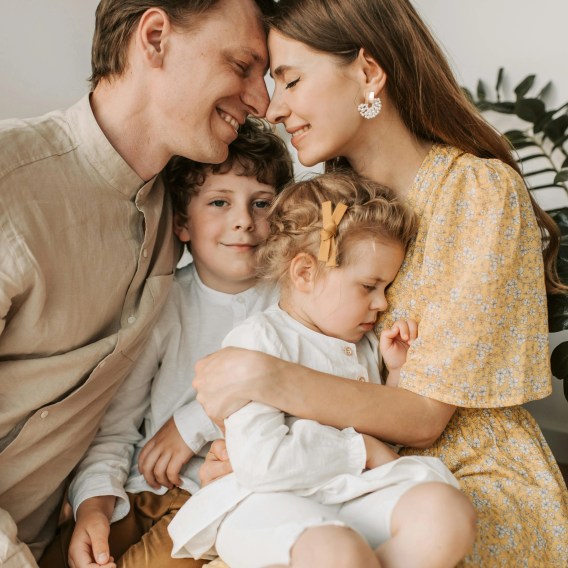
How to Have a Strong Marriage When Raising an Autistic Child
Maintaining a strong, healthy, and happy marriage while raising kids can be tough. But keeping that bond strong while raising an autistic child can be even more challenging.
Here’s a fundamental truth: Being married with children is wonderful and rewarding—but also hard. For parents of autistic children, raising a child is a whole other level of difficulty. More and more moms and dads face this situation; 1 in 36 children have ASD, according to the most recent data from the Centers for Disease Control and Prevention. It’s a diagnosis that’s life-changing for the entire family.
“The diagnosis of a child with Autism and the breakdown in communication create a major strain on a marriage,” says Alisha Griffith, Au.D., CCC-SLP, autism parenting coach, author of Au-mazing Gift: A Journey to Autism Acceptance, and mom to an 11-year-old son with autism.
That sounds ominous since marriage is hard enough without additional stress or strain. It’s true that the time-consuming daily grind of parenting a child on the spectrum, along with the financial and emotional burden involved, can take over moms’ and dads’ lives, leaving little time to nurture a partnership. Neglecting a marriage does not tend to lead to good things, but that isn’t the only option.
Psst… Check Out Big Umbrella Festival Returns to Lincoln Center: Celebrating Neurodiverse Audiences and Artists
In fact, for years, despite no actual scientific source, people thought the divorce rates were significantly higher—80 percent—for parents of children on the spectrum. A study from the Kennedy Krieger Institute debunked the anecdotal rumor. The reality: the divorce rate for parents is the same, regardless of whether they have a child with ASD or not.
That points to something reassuring: Maintaining a healthy, happy marriage as a parent of a child on the spectrum may be challenging, but it’s definitely doable. We spoke to experts, including couples therapists, coaches, and psychiatrists who are deeply familiar with the impact of this diagnosis on relationships to find out practical tips to help your marriage stay strong.
Pick a Path Together
Often, parents react to a diagnosis in very different ways: One parent may seek to become an expert, researching the condition constantly, while the other is subsumed by emotions, feeling sorrow, grief, and frustration. “There’s a misalignment in this response that creates distance,” says Tracy Ross, LCSW, a couples and family therapist who specializes in treating parents of children on the spectrum.
How can couples feel united in this fragmented moment? If it’s a matter of disagreeing over next steps, pick an expert and trust her to steer your path forward, recommends Gail Saltz, M.D., psychiatrist and author of The Power of Different: The Link Between Disorder and Genius. “To some degree, it’s useful to pick your maven and go with that. Pick someone you really both can feel confident in and then let them direct some of that decision-making,” she says.
This is also a moment to sharpen your communication skills, discussing everything from feelings to treatment. That can be harder than it sounds (there’s a reason we praise preschoolers and kindergarteners when they’re good listeners; listening isn’t easy!). Schedule time for judgment-free conversations, recommends Dr. Griffith. “Respect the role of speaker and listener. Take turns to truly listen to each other. Create rules for a safe conversation,” she says, so it doesn’t break down in screams or stony silence.
Make Sure Work is Shared
Typically, one parent becomes the primary caretaker for a child on the spectrum, Dr. Saltz says. (Yes, it’s usually the mom.) And that’s fine, so long as both parents have responsibilities and acknowledge each other’s contributions. “Caretaking doesn’t have to be fifty-fifty,” Dr. Saltz says, but without participation from both moms and dads, resentment festers.
Ross adds that it’s helpful to recognize your spouse’s talents. Consider how your partner can help you become a better parent and where your different skills can be most helpful to your child. “You can’t both be working on the same thing—there’s just too much to do. Divide and conquer is really better,” Ross says.
Bring Back Date Night (or Day)
Your child can easily become the focus of your every conversation, activity, and thought. Doing otherwise may induce feelings of guilt (I shouldn’t go to the movies when I have that towering pile of paperwork to tackle). But your marriage requires attention, too. “Make sure you do carve out time to do pleasurable things together and do not spend every waking moment on your child,” Dr. Saltz says.
“You have to keep your relationship interesting and spicy. You were married way before you were a parent, so you still have to nurture your marriage,” Dr. Griffith says. To that end, put date night on the calendar, just like any other important appointment. If you don’t feel comfortable leaving your child with a caretaker, or can’t afford one, Dr. Griffith suggests shifting date night to date day — after you drop your child off at school, skip out of your responsibilities for a few hours in favor of a long lunch, coffee at your local café, a walk in the park, or a trip to the museum or movies together.
Develop a Support System
It can be deeply lonely to be a parent of a child with ASD. “Parents who don’t have kids with special needs don’t know how hard it is. [They] don’t know what you go through,” says Jennifer Kaufman, an occupational therapist who works in NYC public schools and mom to a 9-year-old son who is on the spectrum.
“When you have a typical child, you meet other families with kids and your world expands, but when you have a kid on the spectrum, your world can constrict, and that’s harder,” Ross says. Simple social gatherings—like a trip to the park or a birthday party—are difficult for kids who are on the spectrum. That leads many parents to just opt out. “Parents with kids on the spectrum get embarrassed, feel judged, feel upset, so they tend to isolate, which can cause stress,” Ross says.
Instead of RSVPing no until the invites end, Ross recommends educating the people around you: Have a conversation with friends about what to expect from your child, and how to talk to their own child about being around kids on the spectrum.
As well as maintaining pre-existing relationships, look to make new connections. “Find other parents who may be having a similar struggle, so you have a community to be able to talk to about these [struggles],” Dr. Saltz says. Ross recommends seeking out support groups for parents of children with special needs.
Consider Volunteering
It can feel relieving and world opening to raise money or volunteer for autism-related causes, Dr. Saltz says. “Doing volunteer work together can be helpful and bonding,” she says.
Immersed in therapy, testing, and schedules, it’s easy to neglect caring for your marriage—but it’s not a small thing to overlook. As Ross points out, “It’s not a luxury to work on your relationship. It’s really important for the adults and the whole family.” Having a strong partnership reduces the likelihood of burnout and allows you to do more on behalf of your children. So go ahead: Enjoy some time with your spouse, and make your partnership a top priority.
Psst… Does Your Marriage Come Before Your Children? The Instagram Debate Continues
























